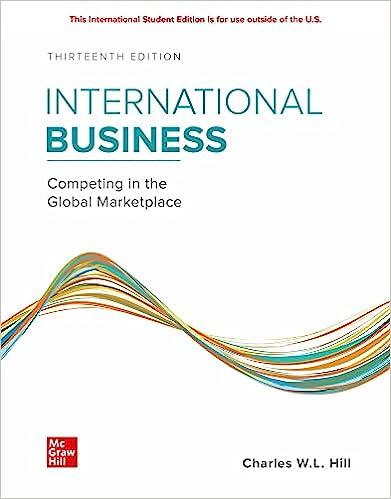In 2013, senior managers at Alibaba, Chinas largest e-commerce enterprise, decided it was time to take the
Question:
In 2013, senior managers at Alibaba, China’s largest e-commerce enterprise, decided it was time to take the company public and offer its shares for sale to retail and institutional investors. Alibaba was founded in 1999 by a former English teacher, Jack Ma, with just $60,000 in capital. Often described as a fusion of Amazon and eBay, by 2013 Alibaba was already the world’s largest online e-commerce company. In 2012, transactions at its online sites totaled $248 billion, more than those of Amazon and eBay combined. Driven by rapid growth in China’s online shopping market, projections called for the company to reach online sales of $713 billion by 2017.
Ma and his colleagues had several motives for the IPO. First, they wanted to raise capital to finance the infrastructure investment required at a company that was growing at breakneck speed. Second, publicly traded shares would give Alibaba a currency that it could use to acquire other enterprises (by offering its shares in exchange for the shares of an acquired company). Third, a public market in Alibaba shares would be a major liquidity event for the large number of Alibaba employees who held stock in the enterprise. It would enable them to more easily sell shares in order to raise cash for other purchases.
Initially, Alibaba considered doing an IPO in Hong Kong. The choice made sense. Hong Kong has a large and liquid stock market that attracts investors from all over the world. However, while Hong Kong is part of China, it retains its own legal system. Hong Kong’s stock exchange has a “one share one vote” requirement. Ma and his colleagues were opposed to this. Even though they would hold only a minority of shares after the IPO, they wanted to retain the ability to nominate more than half of the company’s board of directors, ensuring that they maintained control over the management of the enterprise.
Alibaba entered into negotiations with the Hong Kong Stock Exchange to see if the rules could be changed, but to no avail. As it became increasingly apparent that the Hong Kong exchange was unwilling to change its rules in a timely manner, Alibaba made inquiries to the New York Stock Exchange (NYSE) and the U.S. Securities and Exchange Commission (SEC). The NYSE and SEC indicated they would have no problem with Alibaba’s partners retaining control over more than half of all board seats.
Alibaba realized that an offering on the NYSE would have other advantages beyond retaining control of the board.
The NYSE is the largest and most liquid exchange in the world. The recent successful IPO of Facebook and Twitter had demonstrated that U.S. investors had an appetite for internet offerings. Demand for Alibaba shares was expected to be high, raising the possibility that Alibaba might have a record-setting IPO. Moreover, if its shares were listed on the NYSE, this might make it easier for Alibaba to subsequently use those shares to acquire U.S. and other foreign enterprises, giving Alibaba a bigger global footprint.
The biggest obstacle standing in the way of a U.S. listing was the Chinese government–imposed limits on foreign ownership of Chinese technology businesses. Alibaba was able to circumvent these limits by establishing a complex corporate structure in which investors would actually own shares in a Cayman Island entity, Alibaba Group Holdings, which has contractual rights to all of the earnings of Alibaba China, but no ownership interest in the Chinese entity, which would continue to be owned by Ma and his partners.
The IPO took place on the NYSE on September 18, 2014. The initial offering price was $68 a share, but demand was so strong that Alibaba’s shares opened at $92.70. Alibaba sold 368 million shares in the offering, or about 15 percent of the company. The IPO raised $25 billion for Alibaba, $6 billion more than originally estimated, and valued the company at $231 billion, making it the largest IPO in history.
Questions
1. Why did Jack Ma decide it was time to take Alibaba public?
2. Why do you think the management of Alibaba decided against doing the IPO in China’s main stock market in Shanghai? Why did they ultimately decide against Hong Kong?
3. What were the legal, financial, and strategic advantages to Alibaba of undertaking its IPO in New York?
4. Because the IPO was undertaken in New York, does this make Alibaba an American enterprise?
Step by Step Answer:

ISE International Business Competing In The Global Marketplace
ISBN: 9781260575866
13th International Edition
Authors: Charles Hill





